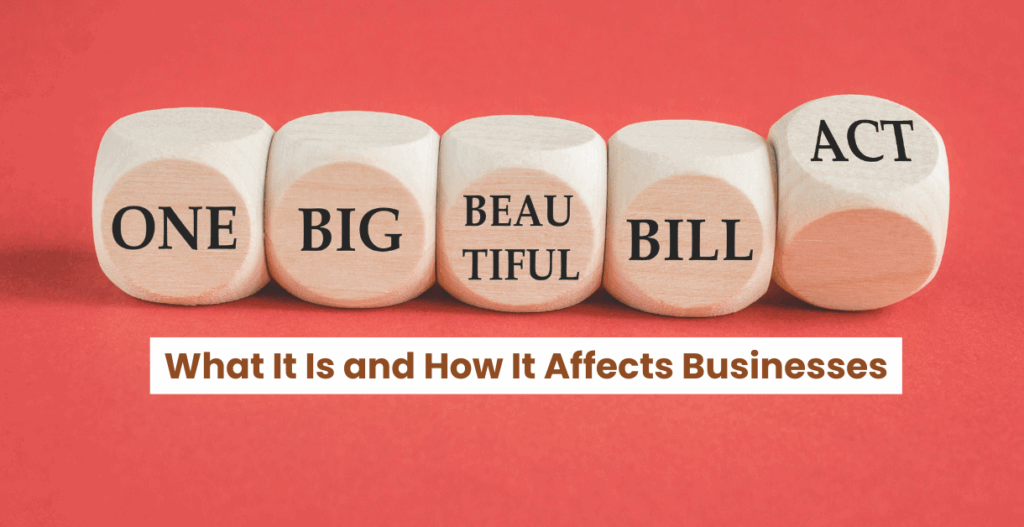

Chris Klug
Chris is a trusted attorney with extensive experience in domestic and international taxation, corporate planning, mergers and acquisitions, and estate planning. He guides clients through complex tax matters to deliver practical solutions.
This article is the third in our focused content series examining the One Big Beautiful Bill Act and its implications for individual taxpayers, estate planning, and businesses. The previous articles in the series may be found below:
1. The One Big Beautiful Bill Act: What It Is and How It Affects Individuals
2. The One Big Beautiful Bill Act and Its Impact on Estate and Gift Taxes
The OBBBA and its Impact on Businesses
The One Big Beautiful Bill Act (the “OBBBA”) is landmark legislation passed on July 4, 2025 that has significant implications for businesses. The OBBBA is comprehensive tax legislation and includes key changes to business related provisions and incentives. Navigating these changes is complex, but understanding them is essential for effective tax planning.
This article will provide a brief summary of the tax provisions in the OBBBA that impact businesses. This article will be followed by articles diving deeper into certain business provisions of the OBBBA to provide a more comprehensive overview with planning opportunities.
Key Business Tax Provisions
- Qualified Business Income (“QBI”) deduction: The OBBBA makes the QBI deduction permanent. The OBBBA also sets a minimum deduction for active QBI for “applicable taxpayers” at $400; defines an applicable taxpayer as one whose aggregate QBI for all active qualified trades or businesses for the tax year is at least $1,000; and establishes inflation adjustments for the new minimums starting in post 2026 tax years. The phase in amounts are increased from $50,000 to $75,000 for single filers and from $100,000 to $150,000 for joint filers.
- Research and Experimental Expenditures: Starting in tax year 2022, prior law required amortization and capitalization over 5 years for certain specified research expenditures (15 years for research performed outside the United States). The OBBBA permanently reinstates immediate expensing of domestic research and experimental expenditures, with an election to amortize certain expenditures. Any amount paid or incurred in connection with the development of any software is treated as research and experimental expenditures. This applies to amounts paid or incurred in taxable years beginning after December 31, 2024. Businesses with gross receipts of less than $31 million can claim the deduction for research and experimental expenditures for tax years 2022 – 2024.
- Bonus depreciation: The OBBBA makes additional first year (bonus) depreciation for certain qualified property permanent at 100% (under prior law, it was to phase out to zero). This provision is effective for property acquired after January 19, 2025. There is also a new 100% bonus depreciation provision for “qualified production property” (“QPP”) which is certain nonresidential real property used in the manufacturing, production or refining of certain tangible personal property. The QPP provision is effective for property placed in service after July 4, 2025.
- Internal Revenue Code (“Code”) Section 179 Expensing limits: For property placed in service after 2024, the Code Section 179 expensing limits are increased to $2,500,000 and the phasedown threshold is increased to $4,000,000 (both subject to inflation adjustments).
- Business interest: For post 2025 tax years, the OBBBA modifies the definition of adjusted taxable income for purposes of Code Section 163(j) limitation on business interest.
Incentives, Exclusions, and Deductions
- Exclusion on gain on the sale or exchange of qualified small business stock (“QSBS”): The OBBBA provides that gain on the “applicable percentage” (50% for stock held for 3 years, 75% for stock held for 4 years, 100% for stock held for 5 years) is eliminated for QSBS acquired after July 4, 2025. Also, the gain exclusion threshold is increased from $10 million to $15 million and the $50 million aggregate gross asset limit is increased to $75 million (subject to inflation adjustments).
- Qualified Opportunity Zones: The OBBBA creates new Qualified Opportunity Zone (“QOZ”) opportunities for capital gains and up to $10,000 of ordinary income. The new rules allow gain to be recognized in the earlier of the year of disposition or 5 years after the investment in the Qualified Opportunity Fund (“QOF”). The new rules increase the investment basis by 10% (30% for Qualified Rural Opportunity Funds) of deferred gain when held for 5 years. If a QOF investment is held for at least 10 years, the new rules increase the basis to the fair market value on the date the investment is sold or exchanged (thus no gain recognition).
- Enhanced manufacturing investment credit: The advanced manufacturing investment credit (also known as the semiconductor credit or the CHIPS credit) on qualified investments in an advanced manufacturing facility built before January 1, 2027 is increased to 35% (up from 25%) for property placed in service after 2025.
- Information reporting, Form 1099-K: The OBBBA retroactively reverts the Form 1099-K reporting threshold back to the pre-ARPA $20,000 and 200 transactions threshold.
- Information reporting, Forms 1099-NEC, 1099 MISC: For payments made after 2025, the reporting thresholds for Forms 1099 NEC and 1099 MISC are increased from $600 to $2,000 (adjusted for inflation after 2026).
- Gain on the sale of certain farmland property: For sales or exchanges occurring after July 4, 2025, sellers of qualified farmland property may elect to pay capital gains tax on the sale in four equal annual installments. The first payment is due with the return for the year in which the sale occurs, with the remaining payments being due with the successive years’ returns (but if a payment is missed, the balance is due immediately).
- Deduction limitation for compensation of publicly held corporation executives: Under the OBBBA, determining compensation that is subject to Code Section 162(m), which limits the amounts that publicly held corporations may deduct for compensation of certain top executives to $1 million per year, is expanded for post 2025 tax years to include all members of a publicly held corporation’s controlled group and affiliated service group.
- Corporate charitable contributions: The OBBBA imposes a new 1% floor (in addition to the 10% ceiling) on corporate charitable deductions for post 2025 tax years.
- Excess business losses: The OBBBA makes the Code Section 461(l) limit on excess business losses permanent.
Energy and Environmental Provisions
- Energy efficient commercial buildings deduction: Under the OBBBA, the energy efficient commercial building deduction terminates for the cost of energy efficient commercial building property whose construction begins after June 30, 2026.
- Cost recovery for energy property: The OBBBA eliminates 5 year MACRS classification for energy property effective for property for which construction begins after 2024.
- Advanced energy project credit: Effective July 4, 2025, “add backs” in the event of the revocation of a project certification are discontinued.
- Advanced manufacturing production credit: The OBBBA terminates the credit for wind energy components produced and sold after December 31, 2027. It also subjects pre-OBBBA applicable critical minerals to a new phaseout schedule and tightens the rules regarding foreign entities.
- Energy efficient home improvement and new energy efficient home credits: The energy efficient home improvement credit under Code Section 25C is terminated for property placed in service after 2025. The new energy efficient home credit under Code Section 45L terminates for any qualified new energy efficient home acquired after June 30, 2026.
- Residential clean energy credit: The residential clean energy expenditures credit is terminated for any expenditures made after 2025.
- Clean vehicle credits: The credits for new and previously owned cleaned vehicles terminate for vehicles acquired after September 30, 2025. The Credit for qualified commercial vehicles also terminates for vehicles acquired after September 30, 2025.
- Alternative fuel vehicle refueling property credits: The credit for “alternative fuel vehicle refueling property” (such as an EV charger) terminates for property placed in service after June 30, 2026.
Tax Planning Opportunities for Businesses
The OBBBA provides businesses with significant tax planning opportunities. It is important for businesses to take advantage of these new opportunities to reduce their overall tax liability to the extent possible. The subsequent articles in this series will provide more in-depth information on each topic summarized above.